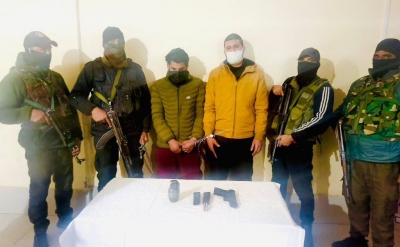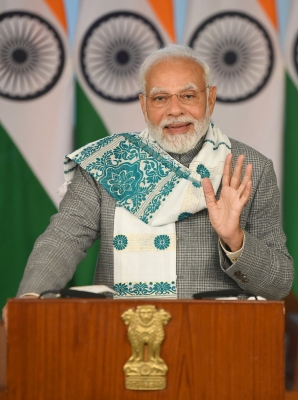 By Rahul Kumar
By Rahul KumarNew Delhi, Feb 2: Pakistan has launched an all-out counter-terror operation to apprehend militants of the Tehreek-i-Taliban Pakistan (TTP) after its cadres launched two audacious back-to-back attacks -bombing a Peshawar mosque killing 101 people, followed by a night raid on a police station in Mianwali, Punjab, shaking the Pakistani establishment to its core.
Pakistani newspaper Dawn quoted IG police Dr Usman Anwar as saying: “We have grounded many field formations of the Punjab police under a new policy, called HITS, Hunt, Impede, Thwart and Serve.” Pakistan has cobbled a force consisting of highly trained police personnel, commandos, the counter-terrorism department (CTD), special protection unit and the elite force.
The TTP’s attack on Mianwali on Tuesday was significant as the militants have challenged the powerful Pakistani army in Punjab—the Pakistani army’s own backyard. Till now the TTP was active in regions close to the Pakistan-Afghanistan border and the Khyber Pakhtunkhwa province. The TTP, also known as Pakistani Taliban, has now extended its geographical sphere of influence stunning the Pakistani establishment.
Despite the strong counter-attack by Pakistani forces, the TTP militants managed to escape in Mianwali. This assault has brought terror to the heart of Pakistan while the Peshawar mosque attack rattled the high-security Police Lines.
In the wake of the Peshawar bombing that killed 101, mostly security personnel, the Pakistani army held the Corps Commanders’ Conference on Tuesday. Chief of Army Staff Gen Asim Munir vowed “zero tolerance” for all terror groups and strategised on battling terrorists through intelligence-based operations.
The commanders also dwelt on the fact that Pakistani security forces were facing major attacks either in Afghan-bordering regions from the TTP, or the large province of Balochistan which is already deep in the throes of a national rebellion. Now this geography has been extended to Punjab and even the national capital Islamabad.
With concern mounting in Islamabad, Pakistani President Arif Alvi has called for a joint session of the National Assembly–the Pakistani Parliament, on February 8 to discuss the Peshawar bombing along with other national concerns–flour shortage and inflation.
Addressing the parliament, Pakistani Defence Minister Khawaja Asif said the decision to hold talks with the TTP militants and resettle them in the country by the Imran Khan regime was a wrong move – one which was not cleared by parliament.
In harsh introspection about his nation’s policies, the Defence Minister rued Pakistan’s strategy to become part of the Afghan Jihad in the 1980s, and then join the ‘War on Terror’. Asif said: “We ourselves sowed the seeds of terrorism when the Russian troops entered Afghanistan and we provided our services to the US on rent. We were very fond of launching a jihad.”
Referring to one of the darkest periods of Pakistan, when TTP militants killed 132 school children in the Army Public School in Peshawar in 2014, Asif has requested Prime Minister Shehbaz Sharif to consider a Zarb-e-Azb kind of an operation to flush out terror groups from the region.
The TTP had recently declared an all-out war against the Pakistani security establishment. With recurring attacks, it has proven its mettle and reach.
In December, the TTP struck Islamabad with a suicide bombing, killing a policeman and injuring six, proving that it had the capacity to hit deep inside Pakistan.
Just before the Islamabad attack, the TTP had taken hostages in Bannu in north-western Pakistan killing two commandos of the Special Services Group (SSG) and injuring 15 others. The Pakistani army had to launch a special operation to free the hostages from the clutches of the TTP. Two hostages too lost their lives.
Pakistan is in a perilous state as the TTP seems to have joined hands with Baloch rebels who have been carrying on a seven-decade old nationalist insurgency. The TTP had gone to the extent of publishing advertisements in local media asking Baloch youth to join them for a common cause against the Pakistani State.
Pakistan’s Balochistan province, which remains under the control of the Pakistani army, groups like the Balochistan Liberation Army (BLA) and the Balochistan Liberation Force (BLF) have wreaked havoc on the security forces. Besides the rebel outfits, the masses too have staged prolonged sit-ins in the strategic port city of Gwadar, which is equally important for Beijing’s supplies.
Pakistan’s strategy of bleeding India with a thousand cuts seems to have boomeranged. Its home-grown and well-honed militants, fed on radical Islam, used so effectively to damage democracies – Afghanistan and India – on either side of its borders are now bleeding its mentor —the Islamic Republic of Pakistan in the quest for Sharia.
(The content is being carried under an arrangement with indianarrative.com)
–indianarrative
Related posts:
- China violated sovereignty of nations across 5 continents: Blinken
- From cricket pitch to racetrack, Dhawan, Chahal, Chahar get ready to experience electric racing cars at 2023 Greenko Hyderabad E-Prix
- Reddit hacked in sophisticated, highly-targeted phishing attack
- ‘Bigg Boss 16’: Salman to launch ‘Naiyo Lagda Dil’ from ‘Kisi Ka Bhai Kisi Ki Jaan’ on finale










